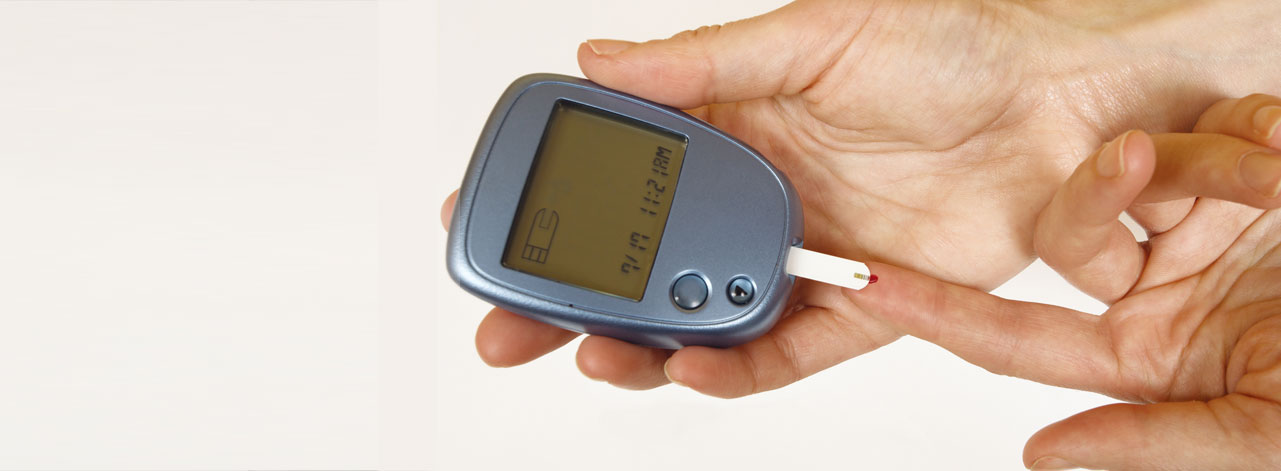About Diabetes
The symptoms which alarm you for a diabetic check :
- Excessive urine production (Polyuria)
- Increased thirst (Polydypsia)
- Increased appetite (Polyphagia)
- Blurred vision
- Unexplained weight loss
- Lethargy
TYPES OF DIABETES
- Type 1
- Type 2
- GDM (Gestational Diabetes)
COMPLICATIONS OF DIABETES
- 1. Acute complications - Those which occur over has immediate effect.
- Hypoglycemia
- Diabetic ketoacidosis
- Infections
- 2. Chronic complications - Those which occur over a longer period of time and involve changes in blood vessels, tissue and organs

- Heart
- Eyes
- Kidneys
- Nerves
- Others
WHAT IS HYPOGLYCEMIA?
Hypoglycemia - is the medical term for low blood sugar levels - that is blood sugar level less than 70mg%.
WHAT CAN CAUSE HYPOGLYCEMIA?
- A delayed or missed meal or snack.
- Not enough food containing carbohydrate.
- Unplanned or strenuous exercise.
- Drinking too much alcohol or alcohol without food.
- Too much insulin / too much diabetes medication.
- Sometimes there is no obvious cause.
SIGNS & SYMPTOMS OF MILD HYPOGLYCEMIA
- Feeling hungry
- Trembling or shakiness
- Sweating
- Headache
- Anxiety or irritability
- Increased Pulse or palpitations
- Tingling of the lips
- Blurred vision
SIGNS & SYMPTOMS OF SEVERE HYPOGLYCEMIA
- Difficulty in concentrating
- Confusion
- Irrational behavior
Once you notice your hypoglycemia warnings, take action quickly or it is likely to become more severe, and you may become unconscious or have a Seizure.
IMMEDIATE TREATMENT
- Sugar
- Glucose
- A glass of fruit juice
- With water or milk, the exact quantity will vary from person to person.
- If your hypoglycemia is more severe you can repeat above measures and contact your doctor immediately.
- Otherwise the people you are with should call an ambulance immediately.
Important: If you are unable to swallow or unconscious, you should not be given anything by mouth. Make sure your family and friends are aware of this. If you are unconscious, you should be placed in the recovery position (on your side with your head tilted back) so that your tongue does not block your throat.
FOLLOW ON TREATMENT
To prevent your blood glucose levels dropping again, you should follow your sugary foods with carbohydrates such as biscuits and milk, half a sandwich, fruit or Buttermilk.
HYPOGLYCEMIA AND DRIVING
Always test your blood glucose levels before driving. If you feel hypoglycemia, stop the car as soon as it is safe to do so and remove the keys from the ignition. Leave the driving seat and treat your hypoglycemia in the usual way. Do not attempt to start driving again until you are sure your blood glucose levels have risen again.
HYPOGLYCEMIA AND ALCOHOL
Drinking a lot of alcohol or drinking on an empty stomach makes a hypoglycemia more likely to occur. The outwards signs of a hypoglycemia are also very similar to those of being drunk. Always have something to eat if you are drinking alcohol, and tell the people you are with about your diabetes and what to do if you need help.
PREVENTING HYPOGLYCEMIA
- Important points to remember:
- Always have something sugary with you for use in an emergency.
- Take frequent food
- Take a cup of milk or a glass of buttermilk before exercise
- Adjust your insulin or tablets doses as per your doctor
- Avoid Alcohol
- Tell your friends or family what signs you have when you go hypoglycemia and how to treat it, as you may not be able to think clearly when your blood glucose goes low.



